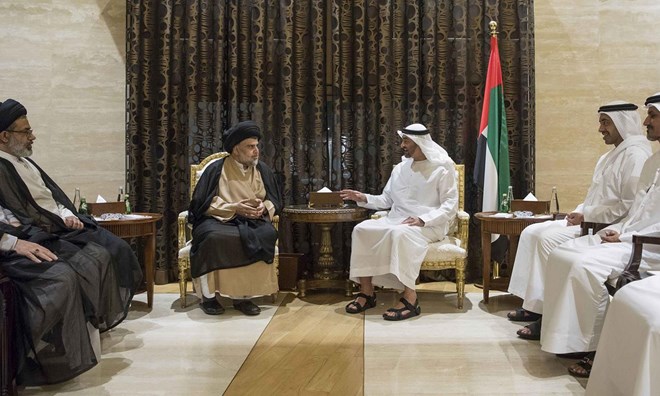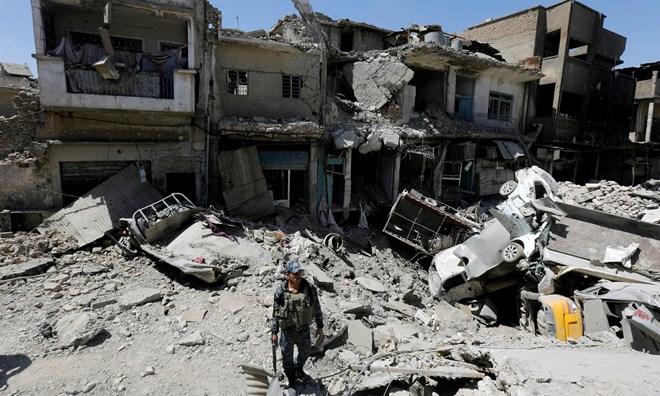
Friday August 18, 2017
By Martin Chulov
Pact would give Saudi Arabia a leading role in rebuilding
war-torn country, and allow it to shepherd Iraq away from its rival
Iran
 A visit by the Iraqi Shia cleric Muqtada al-Sadr to Riyadh last week further thawed relations.
A visit by the Iraqi Shia cleric Muqtada al-Sadr to Riyadh last week further thawed relations.
Photograph: Ryan Carter/AP
Iraq and Saudi Arabia are negotiating a new alliance that would give Riyadh a leading role in rebuilding Iraq’s war-torn towns and cities, while bolstering Baghdad’s credentials across the region.
Meetings between senior officials on both sides over the past six months have focused on shepherding Iraq away from its powerful neighbour and Saudi Arabia’s long-time rival, Iran, whose influence over Iraqi affairs has grown sharply since the 2003 ousting of Saddam Hussein.
Iraq and Saudi Arabia have long been considered opponents in the region, but a visit by the Iraqi Shia cleric Muqtada al-Sadr to Riyadh last week and a follow-up trip to the UAE further thawed relations which had already been much improved by high-profile visits between the two countries.
The arrival in the Saudi capital of Sadr – a protagonist in the sectarian war that ravaged Iraq from 2004-08 and who has enduring ties to Iran – highlights a new level of engagement which could see Riyadh play a significant role in the reconstruction of the predominantly Sunni cities of Mosul, Fallujah, Ramadi and Tikrit.
“This visit was an important step in ensuring that Iraq returns to the Arab fold and is supported in doing so by friendly partners,” said the former Saudi minister of state Saad al-Jabri. “This necessitates limiting Tehran’s continued attempts to dominate Iraq and spread sectarianism. Broader engagement between Riyadh and Baghdad will lead the way for enhanced regional support for Iraq, especially from the Gulf states. This is essential after the capture of Mosul from Isis and as Iraq looks towards national reconstruction.”
Sunni areas of Iraq have borne the brunt of the three-year US-led war against Islamic State, which has been largely successful. Isis no longer controls any city; it is confined to a series of towns in the north-west and throughout Anbar province.
But it is thought it will cost more than $100bn (£78bn) to rebuild Iraq, and the four Sunni cities, as well as three mainly Sunni provinces, are central to hopes of national reconciliation in a country where more than two-thirds of the population are Shia.
As Iraq moves towards national elections early next year, the prime minister, Haider al-Abadi, and Sadr have both said the re-enfranchisement of Sunnis – who lost privileges and status after the fall of Saddam – must be central to rebuilding plans.
“It is also worth noting that Sadr’s visit had a practical aspect and led to some immediate benefits, from the reopening of border crossings and support for internally displaced people, to the potential appointment of a new ambassador and the opening of a consulate in Najaf,” said Jabri. “These are clear signs that there is a concrete desire to recreate a strategic relationship between the two countries of mutual benefit.”
In Baghdad, where attitudes towards Saudi Arabia have been openly hostile throughout the war on Isis, rhetoric blaming Riyadh for the jihadist insurgency has softened recently.
“The relationship is growing now more than ever and this is due to the new US administration helping Saudi Arabia and the Gulf rebuild its relationship with the rest of the region,” said Abdulbari al-Zebari, the head of the foreign relations committee in the Iraqi parliament. “We welcome any foreign or regional funding. This would be a really smart move on behalf of the Arab countries and foreign countries.”
 A member of the Iraqi federal police on patrol in the ruins of Mosul’s Old City this month Photograph: Suhaib Salem/Reuters
A member of the Iraqi federal police on patrol in the ruins of Mosul’s Old City this month Photograph: Suhaib Salem/Reuters
Baghdad and Riyadh had not exchanged ambassadors for 25 years until the ill-fated return of a Saudi envoy in 2015, which prompted a vitriolic series of allegations about responsibility for Iraq’s insurgency and the broader regional chaos. But over the past year, Abadi and the Iraqi president, Fuad Masum, have visited Riyadh, and the Saudi foreign minister has travelled to Baghdad.
“This is a new beginning, a new page of Iraqi Saudi relations,” said Ihsan Al Shameri, the head of the Political Thought Centre in Baghdad. “It was troubled and on edge in the past, especially during [the former prime minister] al-Maliki’s rule. Now that the Saudis have found a non-sectarian political figure in Haider al-Abadi, they are willing to work together. They are no longer focused on a Shia-Sunni rift. Moreover, Iraq wants to ‘return to the Arab fold’ and the window to the Arab world is Saudi Arabia.
“This funding now to rebuild the country is an act of goodwill and their way to show solidarity with the Iraqis knowing we are going through tough economic times.”
Senior officials in Riyadh, which has set itself an ambitious economic and cultural reform agenda, see opportunity in rebuilding the Sunni areas of Iraq as part of broader moves to curb Iran and assert the kingdom as a post-Isis force.
“The situation in Iraq matters to the entire region, in security, economic and political terms,” said Jabri. “It is therefore natural for the Saudi leadership to seek foreign policy avenues to support Iraq at this critical moment. This visit is a clear step in that direction. Muqtada al-Sadr is a respected leader with significant influence. He understands that Iraq’s future lies within the Arab world, and has repeatedly expressed concern about Iran’s growing influence in Iraq.
“Iraq will certainly need significant regional and international support with reconstruction, particularly of cities such as Mosul, Fallujah and Ramadi. Set against the backdrop of a reinvigorated Saudi foreign policy and the importance of the historic Saudi-Iraqi relationship, I would not be surprised to see significant Saudi investment in reconstruction efforts in addition to regional and international leadership on the issue.”
Additional reporting: Nadia al-Faour